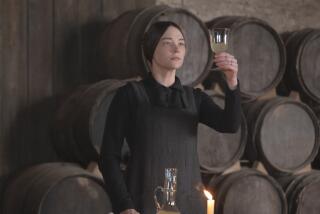Baron Philippe de Rothschild; Member of Banking Empire Became Famed Vintner
- Share via
Baron Philippe de Rothschild, 85, who took his eminent family’s name out of bank vaults and into vineyards, died Wednesday at his Paris home.
He had established an international reputation as vintner, writer, sportsman, stage director and film producer. Although he was heir to one of the world’s great banking fortunes and could have lived in idle comfort, Baron Philippe, as he was commonly known, devoted himself to the land on which he was born and the grapes it produced.
An innovator in the often prosaic world of French wine-making, Baron Philippe distinguished his French product each year by commissioning a different artist to design its label. Braque, Chagall, Miro, Dali, Picasso and Cocteau were among them.
“The first (artists) were hard to get,” he said. “The rest came easy, like pickles from a jar.”
Most recently, in 1979, Baron Philippe fulfilled another lifelong ambition and, with California’s Robert Mondavi Winery, produced Opus 1, an acclaimed Cabernet Sauvignon.
All this seductive glamour, however, was far from his mind when he took over the family vineyard in 1922. He wrote in a 1985 autobiography: “I suppose you think I got off to a good start, born with that outsize silver spoon in my mouth. Well, I didn’t.”
If he had the luxuries, he lacked the love and attention of both his parents and with his womanizing, succeeded in winning the disapproval of a stern grandmother.
If women were then his avocation, his prime pleasure seemed to come from his beloved Chateau Mouton Rothschild.
The vineyard had been in the family since 1853, but both his great-grandfather, who purchased it, and his grandfather paid little attention. His father shared that disinterest and made Baron Philippe manager.
He preserved the old, weathered vines and the equally wizened vintagers who attended them. He began to restore the shabby buildings and brought electricity, running water and telephones to what would become his country estate. He commenced a lengthy campaign to have Mouton reclassified as first growth and to bottle all wines at the chateau.
Today his dream stands at Pauillac, outside Bordeaux, as a magnificent testament to those efforts. It is visited by thousands of tourists each year and produces one of the five great growths of Bordeaux.
All this was while he was still in his 20s and it was then that he also expanded his interests to matters cultural. He wrote poetry, produced plays and made France’s first talking movie, “Le Lac aux Dames,” in 1933.
Sports, particularly auto sports, also became a passion. His Bugatti finished second in the German Grand Prix and fourth in the Monaco Grand Prix in 1929. He twice ran in the Le Mans 24 Hours, finishing fifth in 1929.
He also was known for his translations of such English works as Christopher Marlowe’s “Dr. Faustus.”
During World War II he was arrested and placed in a concentration camp, where his first wife died. He managed to escape, served with the Free French and later was awarded the Croix de Guerre.
Back at home--and because the German administrator of the baron’s estate was a connoisseur--his beloved Mouton was spared and servants preserved not only the vineyard but several sacred treasures that once were in the great synagogue of Paris.
With his American-born second wife, Pauline Fairfax-Potter, who died in 1976, he set up a wine museum at his Mouton estate and welcomed artists and cultural figures from around the world.
Close by that estate is Chateau Lafite, a more traditional vineyard run by another member of the family, Eric.
His only daughter, Philippine, began looking after the day-to-day running of the estate when Baron Philippe became too ill. She is expected to continue his work.
But it was Mouton that produced the latent serenity that contrasted to the hectic earlier years of Baron Philippe’s long life.
Mouton, the baron wrote lovingly in his memoirs, was “an 18th-Century world where people went to bed with candles at 9 o’clock and a deep silence descended on us all.”
More to Read
Sign up for Essential California
The most important California stories and recommendations in your inbox every morning.
You may occasionally receive promotional content from the Los Angeles Times.













